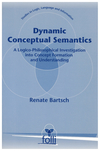

|
|
|
|

Dynamic Conceptual SemanticsA Logico-Philosophical Investigation into Concept Formation and Understanding The book presents a theory of concept formation and understanding that does not make use of a notion of an innate mental language as a means of concept representation. Instead, experimental concepts are treated semantically as stabilizing structuring of growing sets of data, which are sets of experienced satisfaction situations for expressions, and theoretical concepts are based on coherent sets of general sentences held true. There are two kinds of structures to be established. First, there are general concepts by means of similarity sets under perspectives, which grow towards maximal sets with a stabilized internal similarity degree, and these stabilized similarity sets represent a concept, which is understood as an equivalence class of such sets with respect to the internal similarity. Second, there are historical concepts, especially individual concepts as sets of situations connected to each other by contiguity relationships, such as spatial, temporal and causal relationships.This basically data-oriented vision of concept formation gives rise to a theory of understanding new situations and expressions by integrating new data into established sets of data salva stability, or by extending the conceptual structure in a metaphorical or metonymical way. The theory provides a way to understand what identity between propositional attitudes amounts to, especially how people can have more or less the same belief. A comparison with connectionist models of concept formation shows the intended parallels in flexibility and context-addressability. is Full Professor in the Philosophy of Language Institute of Language, Logic, and Computation, Department of Philosophy, University of Amsterdam. Contents
12/1/98 ISBN (Paperback): 1575861240 (9781575861241)
Subject: Linguistics; Semantics; Concepts |
Distributed by the
University of Chicago Press |
|
pubs @ csli.stanford.edu
|
CSLI Publications
Stanford University Cordura Hall 210 Panama Street Stanford, CA 94305-4101 (650) 723-1839 |